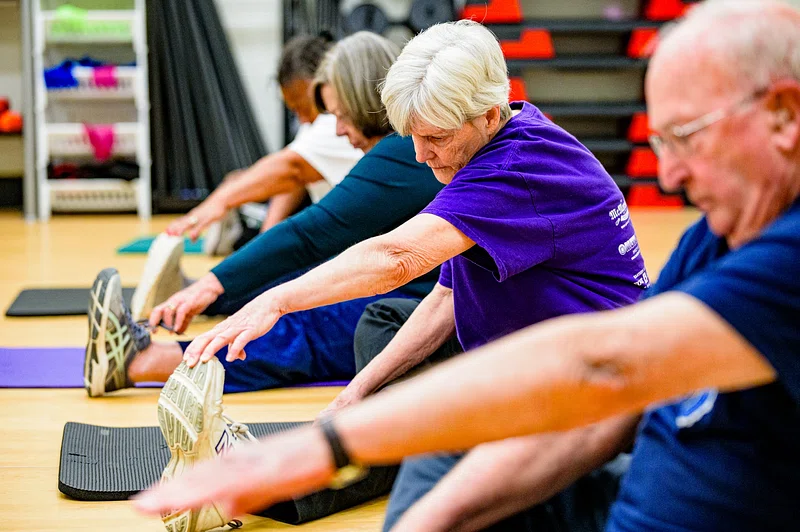10 Daily Habits of People Who Age Well

10 Daily Habits of People Who Age Well
To gauge how your golden years might unfold, it’s common to glance at the aging patterns of your parents or grandparents and assume a similar path lies ahead. However, it’s important to recognize that genetics only offer a partial glimpse of the future.
According to Dr. Nina Blachman, a geriatrician at NYU Langone Health, there are numerous factors influencing successful aging. Among these factors, lifestyle choices play a pivotal role. In fact, embracing specific habits can significantly reduce your risk of conditions such as dementia, cancer, and heart disease—by as much as 30 to 60 percent, as noted by Dr. Audrey Chun, a geriatrician at Mount Sinai.
What’s even more encouraging is that, as Dr. Chun emphasizes, it’s never too late to start prioritizing these lifestyle adjustments to enhance your overall health. Even if you’re well into your senior years, incorporating minor changes can still have a substantial impact.
We’ve sought insights from three experts to uncover the habits that contribute to successful aging and to provide guidance on how to integrate them into your daily routine. From dietary choices to sleep patterns, physical activity, social interactions, and more, these are the behaviors worth shaping your everyday life around.
Meet Our Expert
Nina Blachman, MD, serves as a geriatric specialist at NYU Langone Health and holds the position of associate professor in the Department of Medicine at NYU Grossman School of Medicine.
Audrey Chun, MD, assumes the role of vice chair for clinical services within the Brookdale Department of Geriatrics and Palliative Medicine. Additionally, she is the director of Coffey Geriatrics at the Martha Stewart Center for Living at the Mount Sinai Medical Center.
Crystal Scott, MS, RD, LD, boasts a master’s degree in Dietetics, Nutrition, and Exercise Physiology, complemented by a bachelor’s degree in Exercise Physiology. She is a registered dietitian affiliated with Top Nutrition Coaching.
1. They make exercise a regular habit
We’ve all encountered this advice before: Exercise is a boon for your well-being, and as you age, its significance becomes even more pronounced. According to Dr. Chun, “Maintaining physical activity is among the most effective strategies for aging gracefully.” Dr. Blachman adds that regular exercise bestows benefits upon both your physical and cognitive health.
In particular, aerobic exercise shines as a promoter of heart health, as highlighted by Dr. Chun. Research also underscores its link to reduced risks of cognitive decline and dementia. Dr. Chun further explains that strength training contributes to robust bone health and mitigates the effects of osteoporosis. Simultaneously, flexibility exercises enhance balance and diminish the risk of falls in later years. Dr. Blachman underscores that exercise plays a significant role in managing chronic conditions like diabetes and can alleviate pain.
The most favorable approach comprises a blend of aerobic, strength, and flexibility workouts. Yet, what reigns supreme is discovering an activity that you genuinely relish and can consistently engage in, as advised by Dr. Chun. For individuals dealing with osteoarthritis or chronic musculoskeletal pain, Dr. Blachman suggests that low-impact activities such as yoga or swimming might be more suitable options.
Dr. Chun recommends targeting 150 minutes of exercise each week, equivalent to 30 minutes on five separate days. However, if this feels daunting, commencing with smaller increments is perfectly acceptable. According to her, even short bursts of activity, like 10 minutes a day, yield significant health benefits.
2. They are socially engaged
When we talk about habits that promote a longer, healthier life, we often focus on exercise, diet, and sleep. However, the importance of maintaining social relationships should not be underestimated. According to the Centers for Disease Control and Prevention, nearly one-quarter of adults aged 65 or older experience social isolation, a factor that heightens their susceptibility to health-related issues like dementia, heart disease, and stroke.
The remedy? Engaging in social activities, which, as Dr. Blachman emphasizes, “play a crucial role in maintaining cognitive and psychological well-being in older adulthood.” Building a robust social network provides a shield against feelings of loneliness and isolation.
It’s worth noting that you don’t need to become a social butterfly to reap these benefits. Dr. Chun stresses that it’s the quality and meaning of your relationships that truly matter, not their quantity.
To expand your social network, Dr. Blachman recommends enrolling in courses at local schools or participating in programs at places of worship or senior centers. Additionally, joining interest groups like photography clubs or bird-watching meet-ups can help you connect with people who share your passions, according to Dr. Chun.
3. They don’t smoke
It’s likely unnecessary to emphasize the detrimental impact of smoking on longevity. According to the American Lung Association, smoking stands as the leading global cause of preventable diseases and fatalities, claiming the lives of nearly half a million Americans annually. Smokers face a heightened risk of heart disease and heart attacks compared to non-smokers. For individuals aged 60 and above, smoking shortens life expectancy by an average of six years. Additionally, smoking is associated with various health issues, including cancer, vision problems, diabetes, and a range of other ailments, as reported by the American Lung Association.
The positive news is that quitting smoking can significantly enhance your health, even if you’ve been a long-term or heavy smoker, as stated by the CDC. If you’re not a smoker, it’s essential to refrain from starting this habit. For current smokers, taking measures to break the habit is crucial. You can explore effective strategies for combating cravings, such as those recommended by the Mayo Clinic.
4. They eat a balanced, nutrition-rich diet
Your dietary choices, both in terms of what you consume and what you avoid, wield significant influence over your aging process. Dr. Chun often recommends the MIND diet, which is essentially a low-sodium Mediterranean diet. Research indicates that this diet is associated with lower rates of Alzheimer’s disease. As she explains, the MIND diet primarily consists of an abundance of fruits and vegetables, predominantly plant-based, enriched with nuts, berries, and green leafy vegetables.
Crystal Scott, MS, RD, LD, a registered dietitian affiliated with Top Nutrition Coaching, advocates for nourishing your body with well-rounded, nutrient-packed meals that furnish essential vitamins, minerals, proteins, healthy fats, and carbohydrates. She also highlights the importance of incorporating antioxidants into your diet, as they can counteract oxidative stress, a contributor to cell damage and the aging process.
When planning your meals, Scott recommends including a colorful array of fruits and vegetables, lean proteins, whole grains, and healthy fats like nuts, seeds, and avocados. It’s advisable to limit your consumption of processed foods and sugary snacks, as they can trigger inflammation and contribute to various health issues.
5. They strive for good sleep
Sleep is a vital component of your overall health and well-being, and maintaining a consistent and sufficient sleep pattern is essential for successful aging. As you grow older, both the total duration of your sleep and the time spent in the deepest sleep stages naturally decrease, as explained by Dr. Chun.
For older individuals, it’s advisable to establish a regular bedtime routine and refrain from daytime naps, as recommended by Dr. Blachman. The goal should be to attain a minimum of seven hours of sleep each night while engaging in daytime physical activity to enhance the quality of nighttime sleep. However, it’s worth noting that individual sleep requirements can vary. Dr. Chun advises against fixating on a specific number of hours, as this can create sleep-related anxiety, which can, in turn, make falling asleep more challenging.
6. They minimize alcohol consumption
Many individuals turn to alcohol as a means of alleviating stress, but excessive consumption can have adverse long-term consequences for your health. As outlined in the latest Dietary Guidelines for Americans, misusing alcohol or surpassing recommended limits heightens the risk of conditions such as liver disease, cardiovascular disease, injuries, and alcohol use disorders. The guidelines advise either abstaining from alcohol entirely or limiting intake to two drinks or fewer per day for men, and one drink or fewer per day for women.
It’s essential to bear in mind, however, that accumulating data suggests that even moderate alcohol consumption may not be linked to successful aging and could, in fact, be detrimental, as noted by Dr. Chun. The CDC reports that “emerging evidence indicates that adhering to the recommended limits may still increase the overall risk of death from various causes, including several types of cancer and certain forms of cardiovascular disease.” A 2016 study published in The Lancet concurs, stating that “the safest level of drinking is none.”
If alcohol is a regular part of your routine, it may be worth considering these suggestions from the National Institute of Alcohol Abuse and Alcoholism to reduce your consumption.
7. They cultivate intergenerational friendships
Establishing social connections, regardless of age, can contribute to healthy aging. However, deliberately forging friendships with individuals both older and younger than yourself can offer additional advantages. Dr. Chun highlights that maintaining intergenerational relationships can be particularly meaningful and impactful. While the exact reasons remain unclear, it is likely because these relationships expose you to diverse perspectives and ways of thinking. This, in turn, can benefit your cognitive health by keeping your mind active and engaged.
Therefore, when you find yourself in social settings, don’t limit your interactions to those within your age group. Make a conscious effort to connect with individuals spanning different generations. You can also explore opportunities for volunteering or join groups that facilitate connections with people from various age groups.
8. They don’t skimp on protein
Protein, one of the three macronutrients alongside carbohydrates and fats, plays a vital role in maintaining muscle mass, bone density, and immune function, according to Scott. She emphasizes that as we age, the risk of muscle loss (known as sarcopenia) increases, underscoring the importance of an adequate protein intake to preserve muscle mass and functionality.
To ensure you’re meeting your protein requirements, it’s advisable to incorporate protein-rich foods into each meal. Scott recommends options such as lean meats, fish, eggs, dairy products, legumes, and plant-based sources like tofu and quinoa. While individual protein needs can vary, a general guideline is to aim for between 1.6 to 2.4 grams of protein per kilogram of body weight. For instance, someone weighing 150 pounds should target a daily protein intake ranging from 109 to 163 grams.
9. They continue to challenge themselves
Another prevalent practice among those who age gracefully is their inclination to “engage in diverse challenges,” as highlighted by Dr. Chun. This may involve acquiring new skills, interacting with individuals from diverse backgrounds, or adopting fresh hobbies. By continually stimulating and challenging the brain, you contribute to the maintenance of cognitive health and the preservation of brain function, as Dr. Chun elucidates.
If you discover yourself caught in the monotony of a routine, it’s advantageous to introduce elements of novelty. Dr. Blachman recommends activities such as learning a new language, mastering a musical instrument, or incorporating crossword puzzles into your regular regimen.
10. They consume omega-3 fatty acids
Incorporating consistent sources of omega-3 fatty acids into your diet, such as fatty fish (like salmon and mackerel) and specific seeds and nuts, can assist in reducing inflammation and promoting brain health, as noted by Scott. She references the American Heart Association’s guidance, which suggests consuming a minimum of two servings of fatty fish each week. If you’re not particularly fond of fish, alternatives like flaxseeds, chia seeds, or walnuts can be excellent choices.






